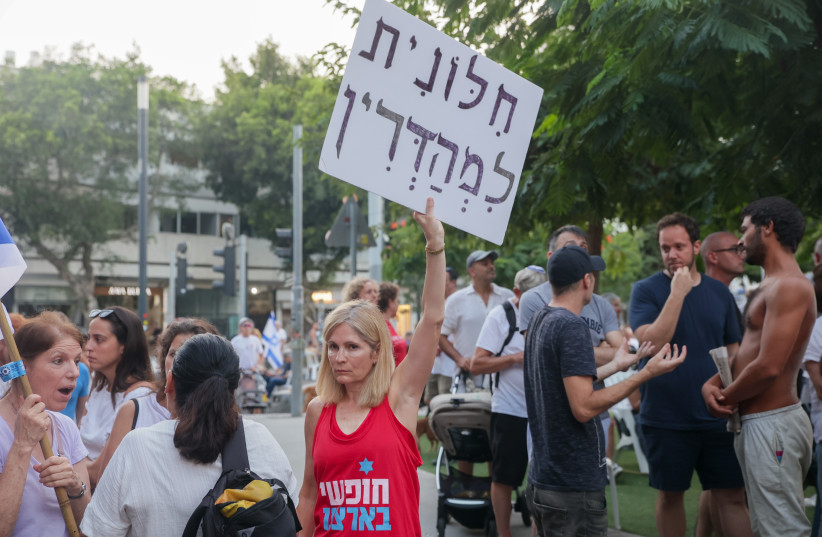Protesters shouted profanities as thousands gathered across Tel Aviv for Yom Kippur prayer sessions in city landmarks like Dizengoff Square and Habima Square on Sunday and Monday nights.
While some protesters were outspoken against gender separation, witness statements told a story of a different experience. One of aggression and anti-religious sentiment. Tel Aviv's Habima Square hosted Tribe Tel Aviv, an open community for Olim (new immigrants to Israel) in their 20s and 30s. It runs a variety of cultural and religious events. They have been running these services for the past three years at Kikar Habima. Tribe welcomes a variety of denominations of Jews who immigrated to Israel, but Sunday night's events would leave them questioning everything.
Unbeknownst to the organizer, the day before Yom Kippur, the Supreme Court upheld a ruling prohibiting such services.
With incidents happening across the city, witnesses said they never thought they would have an antisemitic experience in Israel, after moving to Israel from communities of diaspora Jews. Shlomo Wiesen, 39, is a Tel Aviv resident who attended Tribe Tel Aviv's Habima service and noted clear hostilities from the get-go. Wiesen told the Jerusalem Post that he was one of the people who felt a responsibility to protect holy books from being damaged as the crowd of demonstrators grew more aggressive.
"I felt a sense of purpose actually, to protect our right to pray," Wiesen said. In addition to protecting the prayer books, he saw the responsibility to stand by the rabbi. "Standing by the rabbi while he's being verbally assaulted... it felt more important than the actual tefila (service)."

Wiesen, along with others in attendance, said they were called racists, missionaries, and more. "They told us to go back to America," he added.
Protesters harassed people while in prayer by riding bikes through services
'G', 27, said that the Kol Nidre service did not even get to take place on Sunday night because demonstrators made a splash right away. "It was really shocking to see this, especially in Tel Aviv because usually it's a very accepting atmosphere in the city," 'G' told the Post. A former lone soldier from the United States, she has taken her time finding the religious balance that works best for her living in Israel.
The group initially had a gender divider in place, but it was taken away by demonstrators early on in the program. The service continued for a short time before things became more intense. Rabbi Jonathan Feldman wished to note he only made it to the Shema prayer (often recited before death or in times of danger) when he had to stop due to disruptions that included shouting, whistle-blowing and invasions of personal space.
This evening sent shivers down her spine. "This event made it feel like people are saying there's only one acceptable way to live in Tel Aviv. Like a 'my way or the highway' situation," she said. "I heard two different protesters say anti-Olim things which was very sad and unjust to hear. One said 'I served in Lebanon, what did you do?' and another said 'you guys aren't even speaking the language of the country, what are you doing here.'
"But there were people there like myself and others who came and served in the army as lone soldiers and we do speak Hebrew and it's just like they disregard that. It was not even relevant to what they were supposedly fighting for," she said.
Journalist Shanna Fuld, 29, was one of the hosts of the Habima service and told the Post that she was followed around and mocked by demonstrators who were rifling through prayerbooks, pamphlets, and telling the group they were not welcome in Israel.
They were just people who didn't really care about the gender separation thing, they just wanted to harass religious people."
Daniel Gindis, Tel Aviv resident
Just north of this was the conflict at Dizengoff Square. While demonstrators, described as mostly above age 60, pushed many out of the square for their prayers, they others wanted to band together. Daniel Gindis, 37, moved to Israel as a child with his family. He was saddened by the events at the square and his actions challenged the bluff of the protesters. "I found a group of men and women standing around waiting for something to happen. I offered that we pray together and many joined us. We were harassed soon after we started, initially by a couple of people who yelled about [the separation of genders]," he said.
"We pointed out that there was no divider, and some said OK and left. The large group of people who were left who didn't really care about the gender separation thing, they just wanted to harass people who were praying."
As Gindis continued to lead the group in prayer, a secular military vet who served in the Yom Kippur war approached him and blocked demonstrators from getting in his face. "It was really upsetting to see that we could be treated this way," he added. He returned on the second day to close out the holiday, despite continued protests. "These people were not looking for any kind of compromise," he said.
"This was never about a separation barrier at all, they didn't care who we were with. They were just angry we were there. What’s interesting is the group the protesters were yelling at was a prayer group made up of both religious and secular Jews, young and old, Olim and native-born Israelis all together," Gindis added.
"It’s true we were harassed but the group being harassed was possibly the most diverse and united group of Jews I’ve done any activity with in my life."
Shanna Fuld contributed to this report.
